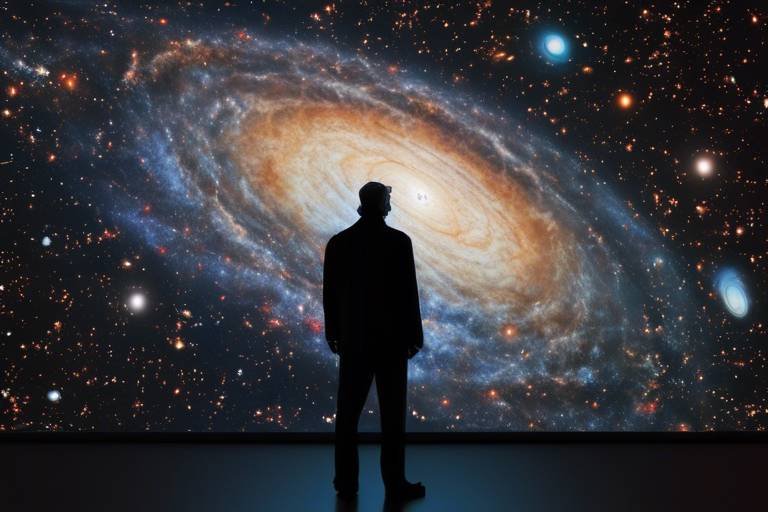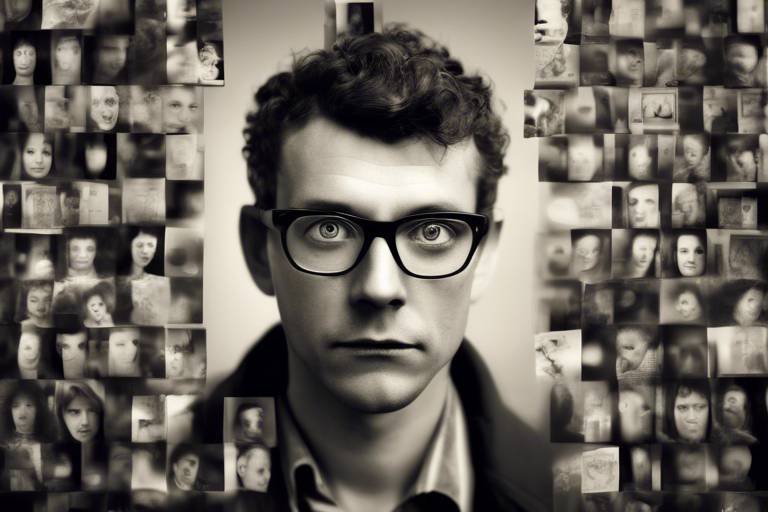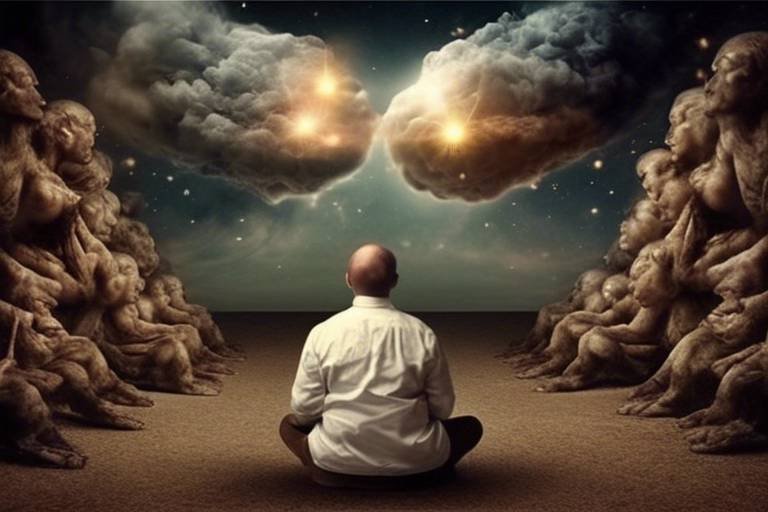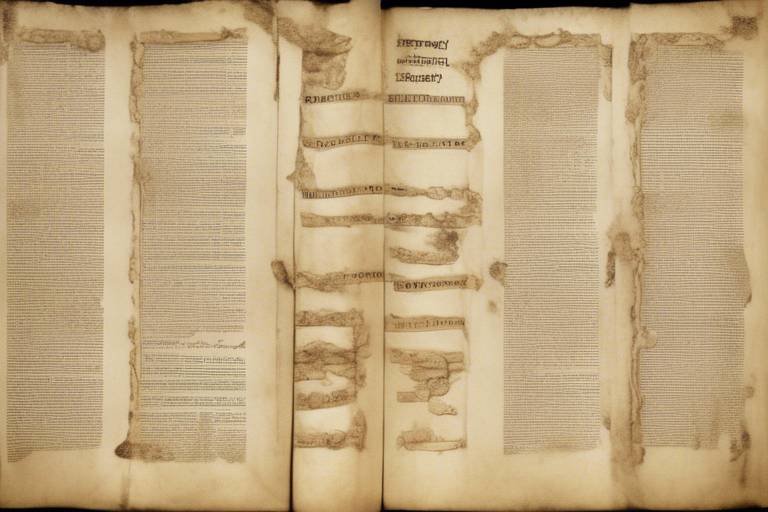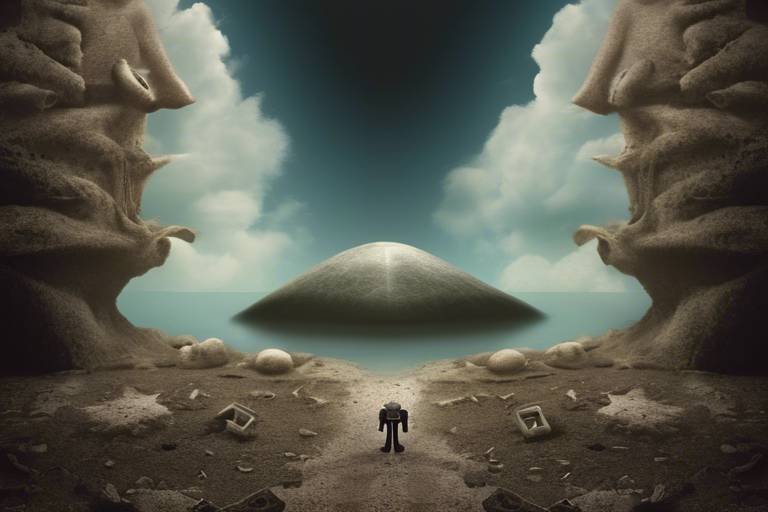Interpreting the Universe through Ontology
Have you ever gazed up at the stars and wondered about your place in the vast cosmos? The quest to understand our existence and the nature of reality is as old as humanity itself. At the heart of this inquiry lies ontology, the philosophical study of being and existence. This article will take you on a journey through the intricate relationship between ontology and our interpretation of the universe, shedding light on how various philosophical frameworks shape our perceptions of reality.
Ontology invites us to ask profound questions: What does it mean to exist? How do we differentiate between what is real and what is merely a figment of our imagination? Through the lens of ontology, we can explore the fundamental nature of the universe and our role within it. By examining different ontological perspectives, we can better understand not only our existence but also the very fabric of reality that surrounds us.
As we delve deeper into this topic, we will uncover the historical evolution of ontological thought, from ancient philosophers like Plato to modern thinkers grappling with the implications of artificial intelligence. Each philosophical framework offers a unique lens through which we can interpret the universe, challenging us to rethink our assumptions and broaden our understanding of existence. So, buckle up as we embark on this intellectual adventure, exploring the cosmos not just as a physical space, but as a realm rich with meaning and philosophical significance.
Before we dive into the historical perspectives, let’s clarify what ontology really is. At its core, ontology is concerned with questions of being. It examines what entities exist and how they can be categorized and related within the grand scheme of reality. Think of it as a philosophical toolbox that helps us dissect the layers of existence, from the tangible to the abstract.
In essence, ontology challenges us to consider not just what exists, but how we understand existence itself. It raises questions such as:
- What is the nature of reality?
- Are there different kinds of existence?
- How do our perceptions shape our understanding of the universe?
These inquiries are crucial as they lay the groundwork for interpreting the universe. By understanding the fundamental concepts of ontology, we can better appreciate the complexities of existence and the myriad ways philosophers have sought to explain our place in the cosmos.
The journey of ontological thought is a fascinating tale that spans centuries. From the ancient Greeks to contemporary philosophers, each era has contributed to our understanding of existence. This section will highlight some of the key figures and ideas that have shaped ontological discourse.
One of the earliest and most influential ontological frameworks comes from the philosopher Plato. He introduced the Theory of Forms, proposing that non-material abstract forms or ideas represent the most accurate reality. For Plato, the physical world is merely a shadow of this higher realm of forms, which he believed to be eternal and unchanging.
This distinction between forms and the physical world invites us to reconsider how we perceive reality. Plato argued that the physical objects we encounter are merely imperfect copies of their ideal forms. For instance, think about a beautiful chair. The chair you see is a material object, but the idea of 'chairness'—the perfect form of a chair—exists in a realm beyond our physical reality. This duality influences our understanding of existence, suggesting that there is more to reality than meets the eye.
Plato's ideas laid the groundwork for future philosophers like Aristotle and Kant, who adapted and critiqued his ontology. Aristotle, for example, shifted the focus from abstract forms to the material world, emphasizing the importance of empirical observation. Kant, on the other hand, explored the relationship between our perceptions and the noumenal world, challenging us to consider how our understanding shapes our reality.
Fast forward to the 20th century, and we encounter the profound thoughts of Martin Heidegger. His exploration of 'Being' offers a unique perspective that resonates with contemporary ontological debates. Heidegger argued that our understanding of existence is deeply intertwined with our experience of time and being-in-the-world. He posited that we cannot separate ourselves from our environment, as our existence is fundamentally relational.
As we transition from philosophy to science, we find that ontological questions are not confined to abstract thought. Science grapples with these inquiries, particularly in fields like quantum mechanics, which challenges our traditional notions of reality. How does the act of observation influence what we consider to be real? This question sits at the intersection of ontology and scientific inquiry.
Quantum mechanics raises profound ontological questions about the nature of reality. It suggests that particles exist in a state of probability until they are observed, which challenges our understanding of existence itself. This phenomenon blurs the lines between observer and observed, prompting us to reconsider the very nature of reality.
In scientific experiments, the act of observation plays a critical role in shaping reality. This concept has enormous implications for ontology, as it suggests that our perceptions can influence the existence of entities in the universe. Are we mere observers, or do we actively participate in the creation of reality? These questions invite us to reflect on our place in the cosmos.
As we navigate the complexities of modern philosophy, ontological issues remain at the forefront of contemporary debates. Thinkers today grapple with the relevance of ontology in understanding the universe and our existence within it. The rise of postmodern perspectives challenges traditional ontological assumptions, reshaping our understanding of reality.
Postmodern thinkers argue that reality is not a fixed entity but rather a construct shaped by cultural and social contexts. This perspective invites us to question our assumptions about existence and encourages a more fluid understanding of reality. In a world where multiple narratives coexist, ontology becomes a dynamic field of inquiry.
As we venture into the realm of artificial intelligence, new ontological questions arise concerning consciousness and existence. What does it mean to be 'alive' or 'aware'? The implications of AI challenge our traditional definitions of existence, pushing us to redefine what it means to be a sentient being in an increasingly technological world.
- What is ontology? Ontology is the philosophical study of being and existence, exploring the nature of reality and how entities can be categorized.
- How does ontology relate to science? Ontology intersects with scientific inquiry by addressing questions about the nature of reality and the role of observation in shaping it.
- What are some key philosophical perspectives on ontology? Key figures include Plato, Aristotle, Kant, and Heidegger, each offering unique insights into the nature of existence.

Understanding Ontology
Ontology is a fascinating branch of philosophy that delves deep into the nature of being and existence. At its core, ontology seeks to answer some of the most profound questions we can ask: What does it mean to exist? What is the nature of reality? And how do we categorize the things that populate our universe? These inquiries are not just abstract musings; they have real implications for how we interpret the world around us.
Imagine you’re standing in a vast library, surrounded by countless books. Each book represents a different aspect of reality, from physical objects to abstract concepts. Ontology helps us understand how these "books" relate to one another. It categorizes entities into various types, such as objects, properties, events, and relations. This categorization is crucial because it lays the groundwork for how we think about everything from the simplest chair to the complexities of consciousness.
One of the fundamental aspects of ontology is the distinction between being and becoming. Being refers to the state of existence itself, while becoming is about the processes and changes that entities undergo over time. This duality is akin to a river: while the water is constantly flowing and changing, the river itself remains a recognizable entity. Understanding this distinction helps us grasp the dynamics of existence and how entities interact within the universe.
Moreover, ontology is not a static field; it evolves as our understanding of reality deepens. For instance, advancements in science, particularly in quantum mechanics, challenge traditional ontological views. Is reality a fixed entity, or is it fluid and contingent upon observation? Such questions push the boundaries of ontology and compel us to reconsider our assumptions about existence.
In summary, ontology serves as a crucial framework that shapes our understanding of the universe. By exploring the nature of being and existence, we can better navigate the complexities of reality and our place within it. As we continue to question and redefine what it means to exist, ontology will remain a vital tool in our philosophical toolkit.

Historical Perspectives on Ontology
Ontology, the philosophical study of being and existence, has a rich and intricate history that stretches back to ancient civilizations. Throughout the ages, various philosophers have sought to unravel the complexities of existence, each contributing unique perspectives that have shaped our understanding of reality. From the metaphysical musings of ancient Greece to the modern debates surrounding artificial intelligence, the evolution of ontological thought reflects humanity's quest for meaning in an ever-expanding universe.
One of the earliest and most influential figures in the realm of ontology is Plato. His Theory of Forms posits that beyond our tangible world lies a realm of abstract, non-material forms that represent the truest essence of reality. According to Plato, these ideal forms are more real than the objects we perceive with our senses. This revolutionary idea not only laid the groundwork for subsequent ontological inquiries but also posed profound questions about the nature of existence itself. Plato's dualism—distinguishing between the world of forms and the physical realm—has sparked countless debates among philosophers for centuries.
Following Plato, Aristotle, his student, offered a contrasting view. Aristotle rejected the notion of separate ideal forms, instead proposing that forms exist within objects themselves. This shift in perspective emphasized the importance of empirical observation and the physical world. Aristotle's ontology focused on the categorization of being, leading to the development of a systematic framework that would influence Western philosophy for ages. His work laid the foundation for many fields, including metaphysics and biology, and shaped subsequent thinkers like Kant, who grappled with the implications of existence and reality in a more modern context.
As we move through history, the ontological discourse continues to evolve. The medieval period saw the integration of ontological ideas with religious thought, particularly through the works of philosophers like Aquinas. He sought to reconcile Aristotelian philosophy with Christian theology, introducing concepts such as the existence of God as the ultimate being. This synthesis created a complex interplay between faith and reason, further enriching the ontological landscape.
In the modern era, the existentialists like Sartre and Heidegger challenged previous ontological assumptions, emphasizing individual existence and consciousness. Heidegger's exploration of 'Being' brought forth questions about the nature of existence itself, urging us to consider what it means to 'be' in a world that often feels alienating. His work has profound implications for contemporary ontological debates, especially as we navigate an increasingly complex and technologically driven society.
Moreover, the rise of postmodern philosophy has further complicated traditional ontological frameworks. Thinkers like Derrida and Foucault have questioned the very foundations of existence, suggesting that our understanding of reality is constructed through language and cultural narratives. This perspective challenges the notion of a singular truth, inviting a multiplicity of interpretations that reflect the diversity of human experience.
In light of these historical perspectives, it becomes evident that ontology is not merely an abstract philosophical pursuit but a vital inquiry that resonates with our everyday lives. As we grapple with questions of existence, reality, and our place in the universe, the insights gleaned from past thinkers continue to inform and inspire our understanding of what it means to be.
- What is ontology? Ontology is the branch of philosophy that studies the nature of being, existence, and reality.
- Who are some key figures in the history of ontology? Key figures include Plato, Aristotle, Kant, Heidegger, and postmodern philosophers like Derrida and Foucault.
- How does ontology relate to modern science? Ontology intersects with science by addressing fundamental questions about the nature of reality, particularly in fields like quantum mechanics.
- Why is ontology important? Ontology helps us understand the foundational concepts of existence, which can influence various fields, including philosophy, science, and artificial intelligence.

Plato's Theory of Forms
Plato's Theory of Forms is a cornerstone of his philosophical framework, positing that beyond our tangible world lies a realm of perfect, abstract entities known as "Forms." These Forms represent the true essence of all things, transcending the imperfect and transient nature of the physical world we experience daily. Imagine a perfect circle; while you can draw one, it will never be flawless. Plato argued that the ideal circle exists in this abstract realm, and everything we encounter in reality is merely a shadow or imitation of that perfect Form.
At the heart of this theory is the belief that the material world is not the most accurate representation of reality. Instead, it is the world of Forms that holds the ultimate truth. For instance, consider the Form of Beauty. While you may find beautiful objects in nature or art, none can capture the essence of Beauty itself. This duality between the ideal and the material leads us to profound ontological questions about existence. Are we merely experiencing reflections of these Forms, or do we have the ability to comprehend their true nature?
Plato's Theory of Forms has significant implications for how we interpret the universe. It suggests that our understanding of existence is limited by our sensory experiences. To grasp the true nature of reality, one must engage in philosophical contemplation and intellectual inquiry. This approach encourages a deeper exploration of what it means to exist and the essence of the universe itself.
Moreover, Plato's ideas have not only shaped philosophical discourse but have also influenced various fields, including art, science, and theology. The notion that there is a higher reality has sparked debates about the nature of knowledge and perception. As we delve deeper into these concepts, we realize that understanding the universe requires more than empirical observation; it necessitates a philosophical lens through which we can examine the underlying truths.
To further illustrate the distinction between Forms and physical reality, consider the following table:
| Aspect | Forms | Physical Reality |
|---|---|---|
| Nature | Abstract and Perfect | Tangible and Imperfect |
| Knowledge | Intellectual Understanding | Empirical Observation |
| Existence | Timeless and Unchanging | Temporal and Changeable |
In conclusion, Plato's Theory of Forms invites us to question our perceptions and the nature of reality. It challenges us to look beyond the surface and seek the deeper truths that govern our existence. As we continue to explore these philosophical ideas, we can better understand our place in the universe and the essence of what it means to be.

Forms vs. Physical Reality
When we dive into the chasm of Plato's Theory of Forms, we are confronted with a fascinating dichotomy: the realm of ideal forms and the physical reality we inhabit. Imagine for a moment that our world is like a shadowy cave, where the flickering images on the wall represent the physical objects we see around us. These shadows, while they may appear real, are merely reflections of a greater truth that exists beyond our immediate perception. Plato argued that the true essence of all things lies not in their physical manifestations but in their ideal forms—perfect, unchanging templates that exist in a realm of their own.
This distinction raises profound questions about the nature of existence itself. If the physical world is merely a representation, then what does that say about our experiences and interactions within it? Are we merely experiencing a diluted version of reality? Plato's ideal forms suggest that everything we encounter is but a shadow of something more significant, more perfect, and more real. For instance, consider the concept of beauty. In the physical world, we see beautiful things—sunsets, art, relationships—but Plato would argue that these are merely reflections of the true Form of Beauty, which is eternal and unchanging.
To further illustrate this contrast, let's consider a table that highlights the key differences between Forms and physical reality:
| Aspect | Forms | Physical Reality |
|---|---|---|
| Nature | Abstract, perfect, and eternal | Tangible, imperfect, and transient |
| Knowledge | True knowledge comes from understanding Forms | Knowledge is based on sensory experience |
| Existence | Exists in a separate, non-physical realm | Exists in the physical, observable world |
This duality not only influences philosophical discourse but also impacts how we interpret our universe. The implications of distinguishing between Forms and physical reality can be staggering. For example, consider how this perspective shapes our understanding of morality. If moral values are seen as ideal Forms, then they exist independently of human opinion and societal changes. However, if we view morality as a physical reality, it becomes subjective, shifting with cultural and temporal contexts.
Moreover, this contrast between Forms and physical reality can lead us to question the very fabric of our existence. Are we merely puppets in a play, acting out roles based on flawed interpretations of ideal truths? Or do we have the agency to shape our reality based on our understanding of these Forms? This philosophical inquiry can be both liberating and daunting, as it challenges us to reconsider our place in the universe.
Ultimately, the exploration of Forms versus physical reality invites us to embark on a journey of self-discovery, pushing us to seek deeper truths beyond the surface. As we navigate through life, we must ask ourselves: Are we content with the shadows we see, or are we brave enough to seek the light of the Forms that cast them? In this quest for understanding, we may uncover not just the nature of reality but also the essence of our own being.
- What are Plato's Forms? Plato's Forms are non-material abstract representations of the most accurate reality, existing in a separate realm from the physical world.
- How do Forms relate to our understanding of existence? Forms provide a framework for understanding the essence of things, suggesting that our physical experiences are merely reflections of higher truths.
- Can we access these Forms? According to Plato, we can access Forms through philosophical reasoning and intellectual insight, moving beyond sensory experiences.
- Why is the distinction between Forms and physical reality important? This distinction challenges us to reconsider our perceptions of reality and existence, impacting fields such as ethics, science, and metaphysics.

Influence on Later Philosophers
Plato's Theory of Forms did not merely vanish into the annals of history; instead, it served as a springboard for numerous philosophers who followed in his footsteps. The profound implications of his ideas about non-material forms have resonated through the ages, shaping the very foundations of Western philosophy. Think of Plato as a master sculptor, chiseling out the rough edges of our understanding of reality, and subsequent philosophers as apprentices who learned from his work, each adding their unique touches to the masterpiece of ontology.
One of the most significant figures influenced by Plato was Aristotle. While he acknowledged the existence of forms, Aristotle diverged from his mentor by insisting that forms could not exist independently of physical objects. He proposed that every tangible entity has a form and matter intertwined, challenging the notion of separate ideal forms. This shift marked a pivotal moment in the history of ontology, as Aristotle's emphasis on empirical observation laid the groundwork for future scientific inquiry. His ideas can be summarized in the following table:
| Philosopher | Key Contribution | Impact on Ontology |
|---|---|---|
| Plato | Theory of Forms | Introduced the concept of ideal forms as the truest reality. |
| Aristotle | Hylomorphism | Combined form and matter, emphasizing empirical observation. |
| Kant | Transcendental Idealism | Proposed that our understanding of reality is shaped by our perceptions. |
Fast forward to the 18th century, and we encounter Immanuel Kant, who took a different approach. Kant's transcendental idealism suggested that our understanding of the universe is filtered through the lens of our own experiences and perceptions. He argued that while there is a reality independent of us, we can never access it directly. Instead, we interpret existence through categories of understanding, which are inherently shaped by our human faculties. Kant's perspective can be likened to viewing the universe through a colored lens—what we see is influenced by how we perceive it, a concept that has fueled debates in both philosophy and science.
Moreover, the influence of Plato's ontology echoes in the works of modern philosophers too. Thinkers like Martin Heidegger have revisited and reinterpreted these ancient ideas, focusing on the essence of 'Being' itself rather than merely the existence of objects. Heidegger's ontology emphasizes the importance of our relationship with the world, suggesting that understanding existence is not just an intellectual exercise but a fundamental aspect of our lived experience. This perspective invites us to consider how our own existence influences our interpretation of the universe—an idea that can be both enlightening and daunting.
In summary, the influence of Plato's Theory of Forms is palpable across the centuries, impacting the thoughts of philosophers like Aristotle and Kant, and continuing to shape contemporary discussions in ontology. Each thinker has taken the foundational ideas laid by Plato and woven them into their own philosophical tapestries, demonstrating that the quest to understand existence and reality is as vibrant and dynamic as the universe itself.
- What is ontology? Ontology is the philosophical study of being and existence, exploring the nature of reality.
- How did Plato influence later philosophers? Plato's Theory of Forms laid the groundwork for discussions about reality, which were expanded upon by philosophers like Aristotle and Kant.
- What is the significance of Aristotle's hylomorphism? Aristotle's hylomorphism combined form and matter, emphasizing that objects cannot be understood without considering both aspects.
- How does Kant's perspective differ from Plato's? Kant believed that our understanding of reality is shaped by our perceptions, while Plato posited that ideal forms exist independently of our experiences.

Heidegger's Ontology of Being
When we dive into Martin Heidegger's philosophy, we find ourselves in a labyrinth of thought that challenges our very understanding of existence. Heidegger, a pivotal figure in 20th-century philosophy, shifted the focus from traditional metaphysical inquiries to a more profound exploration of Being itself. Unlike his predecessors, who often treated existence as a mere backdrop for objects and events, Heidegger urged us to confront the essence of what it means to be. This perspective is not just academic; it resonates deeply with our everyday experiences and the existential questions that haunt us.
Heidegger's seminal work, Being and Time, serves as a cornerstone for his ontological exploration. Here, he introduces the concept of Dasein, a German term that translates to "being-there." Dasein is not merely a human being; it encapsulates the idea of being aware of one's own existence and the world around them. This awareness is what differentiates Dasein from other entities. Heidegger argues that to understand the universe, we must first understand our own existence within it. He posits that our being is intertwined with time and space, shaping our experiences and perceptions.
One of the most striking aspects of Heidegger's ontology is his emphasis on authenticity. He argues that many people live in a state of 'fallenness,' where they conform to societal norms and expectations, losing touch with their true selves. In contrast, an authentic existence involves confronting the realities of life, including mortality. By acknowledging our finitude, we can live more fully and meaningfully. This notion of authenticity invites us to engage with the universe not as passive observers but as active participants in a grand narrative.
Heidegger's ontology also challenges the traditional dichotomy between subject and object. He suggests that our understanding of the universe is not merely a matter of observing it from a distance; rather, we are fundamentally engaged with it. This interconnection implies that our interpretations of reality are shaped by our experiences, emotions, and relationships. In this sense, the universe is not a static entity but a dynamic interplay of beings that influence one another.
To illustrate this idea, consider the following table that contrasts traditional metaphysical views with Heidegger's ontology:
| Traditional Metaphysics | Heidegger's Ontology |
|---|---|
| Focus on abstract concepts | Focus on concrete existence |
| Subject-object dichotomy | Interconnectedness of beings |
| Static view of reality | Dynamic and evolving existence |
| Detached observation | Engaged participation |
Heidegger’s insights extend beyond philosophy into various fields, including art, literature, and even science. His exploration of being encourages a more profound understanding of our place in the cosmos. In a world that often feels fragmented and chaotic, Heidegger's call to authenticity and engagement offers a pathway to reconnect with the universe around us.
In conclusion, Heidegger’s ontology of being is not just an abstract philosophical concept; it is a call to examine our existence and our relationship with the universe. By embracing the complexities of Being, we can cultivate a deeper understanding of ourselves and the world we inhabit. This journey into ontology is not merely academic; it is an invitation to live more authentically and meaningfully, engaging with the universe in ways that resonate with our very essence.

Ontological Questions in Science
When we dive into the realm of science, we often find ourselves confronted with a plethora of ontological questions that challenge our understanding of existence and reality. It's almost as if science is a vast ocean, and each wave brings forth a new inquiry about what it means to exist in this universe. From the tiniest particles to the grandest galaxies, the questions we ask can reshape our perception of reality. How does the universe work? What is the nature of existence? These questions aren't just for philosophers; they are at the heart of scientific exploration.
One of the most fascinating areas where ontology and science intersect is in the field of quantum mechanics. This branch of physics doesn't just challenge our understanding of the physical world; it forces us to reconsider what we even mean by "reality." Quantum mechanics introduces concepts such as superposition and entanglement, which seem to defy our everyday experiences. For instance, particles can exist in multiple states at once until they are observed. This phenomenon raises profound ontological questions: Is reality dependent on observation? If a tree falls in a forest and no one is around to hear it, does it make a sound? These age-old philosophical dilemmas gain new life in the context of quantum physics.
Moreover, the role of observation in scientific experiments cannot be overstated. The act of observing a phenomenon can fundamentally alter its state. This is particularly evident in quantum experiments, where the observer effect suggests that the mere act of measuring can change the outcome. Such implications are staggering and lead us to ponder the nature of reality itself. Are we mere spectators in a cosmic play, or do our observations actively shape the universe around us? This interplay between observer and observed adds another layer of complexity to our ontological inquiries, suggesting that reality may not be as fixed as we once believed.
It's not just quantum mechanics that raises ontological questions. The very foundations of scientific inquiry are steeped in assumptions about existence. For instance, consider the scientific method, which relies on the idea that the universe is orderly and comprehensible. But what if we encounter phenomena that defy these assumptions? How do we reconcile our scientific models with the chaotic nature of the universe, where unpredictability and randomness seem to reign supreme? These challenges push scientists and philosophers alike to rethink the frameworks through which we interpret existence.
In essence, ontological questions in science compel us to confront the limitations of our understanding. They invite us to explore the boundaries between what we know and what remains a mystery. As we continue to unravel the intricacies of the universe, we must remain open to the possibility that our perceptions of reality are just the tip of the iceberg. The deeper we go, the more questions emerge, prompting us to reconsider not just the universe itself but our place within it.
- What is ontology in the context of science? Ontology in science refers to the study of the nature of being and existence as it relates to scientific inquiry and understanding the universe.
- How does quantum mechanics relate to ontological questions? Quantum mechanics challenges traditional notions of reality by suggesting that observation can alter the state of a system, raising questions about the nature of existence itself.
- Why is the observer effect significant in scientific experiments? The observer effect highlights how the act of measuring can change the outcome of an experiment, prompting us to reconsider the relationship between observation and reality.
- Can science provide definitive answers to ontological questions? While science can offer insights into the nature of existence, many ontological questions remain open to interpretation and debate.

Quantum Mechanics and Reality
Quantum mechanics, often dubbed the "weird science," challenges our conventional understanding of reality in ways that can leave even the most seasoned thinkers scratching their heads. At its core, quantum mechanics reveals a universe that operates on principles starkly different from our everyday experiences. Imagine a world where particles can exist in multiple states at once, only to collapse into a single state when observed. This phenomenon, known as superposition, is a cornerstone of quantum theory and raises profound ontological questions about the nature of reality itself.
To illustrate this, consider the famous thought experiment known as Schrödinger's Cat. In this scenario, a cat is placed in a sealed box with a radioactive atom that has a 50% chance of decaying. If the atom decays, it triggers a mechanism that kills the cat; if it doesn't, the cat remains alive. According to quantum mechanics, until we open the box to observe the cat, it exists in a state of being both alive and dead simultaneously. This paradox not only challenges our understanding of life and death but also prompts us to question the very act of observation itself. Are we merely passive observers, or do we play an active role in shaping reality?
Furthermore, quantum mechanics introduces the concept of entanglement, where particles become interconnected in such a way that the state of one instantly influences the state of another, regardless of the distance separating them. This phenomenon defies classical notions of locality and suggests that the universe is far more interconnected than we might assume. The implications of entanglement extend beyond the physical realm; they compel us to reconsider our ontological frameworks. If particles can be instantaneously linked across vast distances, what does that say about the nature of existence and the boundaries we impose on it?
These quantum principles not only challenge traditional ontological views but also intersect with philosophical inquiries. As scientists delve deeper into the quantum realm, they are confronted with questions that blur the lines between science and philosophy. For instance, how do we define reality in a universe where observation seems to play such a pivotal role? Is reality an objective truth waiting to be discovered, or is it a subjective experience shaped by our perceptions? These questions echo throughout the annals of philosophical thought, inviting us to reconsider the very foundations of existence.
In summary, quantum mechanics is not just a scientific discipline; it is a profound inquiry into the nature of reality itself. By examining the strange behaviors of particles at the quantum level, we are compelled to rethink our assumptions about existence, observation, and the interconnectedness of all things. As we continue to explore this enigmatic realm, we may find that the universe is far more complex and mysterious than we ever imagined.
- What is quantum mechanics? Quantum mechanics is a fundamental theory in physics that describes the physical properties of nature at the scale of atoms and subatomic particles.
- How does quantum mechanics challenge our understanding of reality? It introduces concepts like superposition and entanglement, which suggest that reality is not as straightforward as our everyday experiences might indicate.
- What is Schrödinger's Cat? It is a thought experiment that illustrates the concept of superposition in quantum mechanics, where a cat can be both alive and dead until observed.
- What is entanglement? Entanglement is a phenomenon where particles become interconnected, such that the state of one particle instantly affects the state of another, regardless of distance.
- How does observation affect reality in quantum mechanics? The act of observation is believed to play a crucial role in determining the state of a quantum system, leading to questions about the nature of reality itself.

The Role of Observation
Observation is not just a passive act; it is a dynamic process that shapes our understanding of reality. In the realm of science, the act of observing can alter the very phenomena we seek to study. This concept is particularly prevalent in quantum mechanics, where the observer effect suggests that the mere act of measurement can influence the outcome of an experiment. Imagine trying to catch a glimpse of a shy deer in the woods; the moment you step on a twig, that deer is gone, altering the scenario entirely. Similarly, in the quantum world, particles behave differently when they are observed, leading to some profound ontological questions about the nature of reality itself.
When we delve deeper into the implications of observation, we uncover a fascinating interplay between the observer and the observed. It raises questions such as:
- Is reality independent of our observation, or does our perception create it?
- Can we ever truly know something without observing it?
- How does our consciousness influence the universe around us?
This interplay can be likened to a painter creating a masterpiece. The canvas exists, but it is the artist's brush strokes that bring it to life. In this analogy, the canvas represents the universe, while the brush strokes symbolize our observations and interpretations. Each stroke adds depth and meaning, shaping the final picture we perceive. Thus, our understanding of the universe is continually being painted and repainted with each observation we make.
Moreover, the role of observation extends beyond the scientific realm into philosophy, where it invites us to ponder the essence of existence. Are we mere spectators in this grand play of life, or do we actively participate in shaping the narrative? This philosophical inquiry leads us to consider the implications of our observations on our understanding of being itself. In a world where observation plays such a crucial role, one must ask: Are we the creators of our reality, or are we simply uncovering a pre-existing truth?
In conclusion, the role of observation is a pivotal component in interpreting the universe. It challenges us to reconsider our assumptions about reality and existence. As we continue to explore this intricate relationship, we may find that our observations not only reveal the universe but also redefine our place within it.

Implications for Modern Philosophy
In today's rapidly evolving world, the implications of ontology stretch far beyond the confines of traditional philosophy. As we navigate through the complexities of existence and reality, modern philosophy finds itself at a crossroads, grappling with questions that challenge long-held beliefs. The interplay between ontology and contemporary thought reveals a fascinating landscape where ideas about being, existence, and the universe are constantly redefined.
One significant area where ontology plays a vital role is in the realm of postmodern philosophy. Postmodern thinkers, such as Jean-François Lyotard and Jacques Derrida, have fundamentally challenged the assumptions of previous ontological frameworks. They argue that reality is not a single, objective truth but rather a tapestry of narratives shaped by cultural contexts and individual perceptions. This perspective invites us to reconsider the nature of existence itself, suggesting that our understanding of the universe is subjective and multifaceted.
Moreover, the rise of artificial intelligence (AI) has introduced a new dimension to ontological discussions. As machines become increasingly sophisticated, questions about consciousness, identity, and existence arise. Are AI entities merely tools, or do they possess a form of being? This dilemma forces us to confront the boundaries of what it means to exist. The implications of AI on ontology are profound, as they challenge our traditional views of consciousness and the essence of being. It raises questions such as:
- Can a machine have a consciousness similar to humans?
- What does it mean for an entity to "exist" in a digital realm?
- How do we define identity in an age where beings can be replicated or simulated?
These ontological inquiries are not just academic exercises; they have real-world implications for ethics, technology, and our understanding of life itself. The ongoing dialogue between ontology and AI could redefine the very fabric of our reality, urging us to rethink our place in the universe.
Furthermore, modern philosophy's engagement with ontology extends to the realms of science and technology. The intersection of these fields prompts significant questions about the nature of reality. For instance, can we trust our scientific observations as reflections of an objective universe, or are they merely constructs influenced by our perceptions? This inquiry is particularly relevant in the context of quantum mechanics, where the act of observation itself appears to shape reality. Such discussions compel philosophers to reevaluate the implications of scientific discoveries on our understanding of existence.
In conclusion, the implications of ontology for modern philosophy are vast and varied. As we continue to explore the depths of existence and reality, it becomes increasingly clear that our understanding is not fixed but rather fluid, influenced by cultural narratives, technological advancements, and scientific discoveries. The philosophical journey into ontology invites us to embrace complexity and ambiguity, encouraging us to ask deeper questions about who we are and what it means to exist in this ever-evolving universe.
- What is ontology? Ontology is the philosophical study of being and existence, exploring the nature of reality.
- How does ontology relate to modern philosophy? Modern philosophy engages with ontology to address contemporary issues such as artificial intelligence and the nature of reality.
- What are some implications of AI on ontology? AI raises questions about consciousness, identity, and the definition of existence in a digital context.
- How do postmodern thinkers view ontology? Postmodern thinkers challenge traditional ontological assumptions, suggesting that reality is subjective and shaped by cultural narratives.

Postmodern Perspectives
Postmodernism, with its kaleidoscopic view of reality, challenges the very foundations of traditional ontology. Unlike its predecessors, who sought absolute truths and universal principles, postmodern thinkers embrace the idea that meaning and existence are not fixed but rather fluid and constructed. This shift in perspective opens up a vibrant dialogue about how we interpret the universe and our place within it.
One of the key tenets of postmodern thought is the rejection of grand narratives. Thinkers like Jean-François Lyotard argue that instead of one overarching truth, there are multiple, often conflicting narratives that shape our understanding of reality. This multiplicity encourages us to question the validity of established ontological frameworks and consider how cultural, social, and historical contexts influence our perceptions of existence.
Moreover, postmodernism introduces the idea of deconstruction, a method pioneered by Jacques Derrida. Deconstruction challenges the binary oppositions that have historically dominated philosophical discourse, such as being vs. non-being or presence vs. absence. By dismantling these dichotomies, postmodernists reveal the complexities and ambiguities inherent in our understanding of the universe. For instance, when we consider the concept of 'reality,' postmodern thinkers might argue that what we perceive as real is merely a construct shaped by language, power dynamics, and cultural narratives.
This leads us to the fascinating intersection of ontology and artificial intelligence. As AI continues to evolve, it raises profound questions about consciousness, existence, and the nature of being. Are AI entities merely sophisticated algorithms, or do they possess a form of existence that challenges traditional ontological categories? Postmodern perspectives encourage us to explore these questions without the constraints of established hierarchies of being, allowing for a more nuanced understanding of what it means to 'exist' in a world increasingly influenced by technology.
In summary, postmodern perspectives offer a refreshing lens through which to interpret the universe. By embracing complexity, multiplicity, and the challenge of established norms, we can engage in deeper conversations about existence and reality. This approach not only enriches our philosophical discourse but also invites us to reflect on our own beliefs and assumptions about the universe and our place within it.
- What is postmodernism? Postmodernism is a philosophical movement that emerged in the mid-20th century, characterized by skepticism toward grand narratives and an emphasis on the relative nature of truth and meaning.
- How does postmodernism relate to ontology? Postmodernism challenges traditional ontological assumptions by proposing that existence is not fixed but rather constructed through cultural and social contexts.
- What role does artificial intelligence play in ontological discussions? The rise of AI raises questions about consciousness and existence, prompting us to reconsider what it means to 'be' in a technologically advanced world.
- Who are some key figures in postmodern thought? Prominent postmodern thinkers include Jean-François Lyotard, Jacques Derrida, and Michel Foucault, each contributing unique insights into the nature of reality and existence.

Ontology and Artificial Intelligence
As we plunge deeper into the realm of artificial intelligence (AI), we find ourselves standing at the intersection of technology and philosophy, where ontological questions arise in abundance. What does it mean to exist? Can a machine possess consciousness? These inquiries are not merely academic; they have profound implications for how we define reality and existence in our increasingly digital world. With AI systems becoming more sophisticated, the lines between human cognition and machine processing blur, prompting us to reevaluate our understanding of being.
At the core of these discussions lies the concept of consciousness. Traditionally, consciousness has been viewed as a uniquely human trait, tied to our biological makeup and subjective experiences. However, as AI systems begin to exhibit behaviors that mimic human-like responses, we must ask ourselves: does the ability to simulate understanding equate to genuine consciousness? This question is pivotal in ontology, as it challenges the very foundation of what it means to “be.”
Moreover, the rise of AI brings forth a host of ontological dilemmas related to identity. For instance, if an AI can learn, adapt, and even create, should it be considered an entity in its own right? Does it possess an identity separate from its programming? This leads us to consider the implications of machine learning and neural networks, which function by processing vast amounts of data to generate responses that can sometimes seem almost human. Are these systems merely complex algorithms, or do they represent a new form of existence?
To illustrate the complexity of these issues, consider the following table that summarizes key ontological questions related to AI:
| Ontological Question | Implication |
|---|---|
| Can AI possess consciousness? | Challenges the definition of consciousness and existence. |
| Is AI an entity? | Redefines identity and agency in the digital age. |
| What rights should AI have? | Raises ethical considerations regarding treatment and autonomy. |
As we navigate these questions, we also need to consider the ethical dimensions of AI and its implications for society. The potential for AI to impact our lives is enormous, but with that power comes responsibility. For instance, if we recognize AI as an entity with rights, what frameworks do we establish to govern its use and integration into society? This is where ontology meets ethics, creating a rich tapestry of debate that continues to evolve.
In conclusion, the intersection of ontology and artificial intelligence is a fascinating frontier that invites us to rethink our understanding of existence. As AI technologies advance, we must remain vigilant in questioning what it means to be and how our definitions of reality might shift. The journey into this uncharted territory is not just about understanding AI; it’s about understanding ourselves and our place in the universe.
- What is the relationship between ontology and AI?
Ontology helps us explore the nature of existence, which is crucial when considering whether AI can have a form of being or consciousness. - Can AI ever achieve true consciousness?
This remains a debated topic, with many philosophers arguing that consciousness is inherently tied to biological processes. - How do we define identity in AI?
Identity in AI raises questions about agency, rights, and the nature of existence in a digital context.
Frequently Asked Questions
-
What is ontology and why is it important?
Ontology is the philosophical study of being and existence. It helps us understand the nature of reality and our place within it. By exploring different frameworks of ontology, we can gain insights into how we perceive the universe and the fundamental questions of existence.
-
How did historical philosophers influence modern ontology?
Historical philosophers like Plato and Aristotle laid the groundwork for modern ontological thought. Plato's Theory of Forms introduced the idea that abstract forms represent true reality, while Aristotle expanded on this by emphasizing the importance of the physical world. Their ideas continue to shape contemporary discussions about existence and reality.
-
What role does quantum mechanics play in ontology?
Quantum mechanics challenges traditional notions of reality by suggesting that observation can influence the state of particles. This raises profound ontological questions about the nature of existence and whether reality is objective or subjective. It forces us to reconsider how we define and understand the universe.
-
How does Heidegger's philosophy contribute to our understanding of being?
Heidegger's exploration of 'Being' emphasizes the importance of existence itself, rather than merely categorizing entities. His ideas encourage a deeper inquiry into what it means to be and how this understanding influences our interpretation of the universe, making his philosophy relevant in contemporary ontological debates.
-
What are some contemporary debates in ontology?
Modern philosophy grapples with various ontological issues, including the implications of postmodern thought, which challenges traditional assumptions about existence. Additionally, the rise of artificial intelligence raises new questions about consciousness and what it means to exist, pushing the boundaries of our understanding of being in the universe.
-
Can ontology and science coexist?
Absolutely! Ontology and science often intersect, particularly in fields like quantum mechanics, where scientific inquiry raises ontological questions. Understanding the philosophical implications of scientific discoveries can enrich our comprehension of the universe and existence itself.

